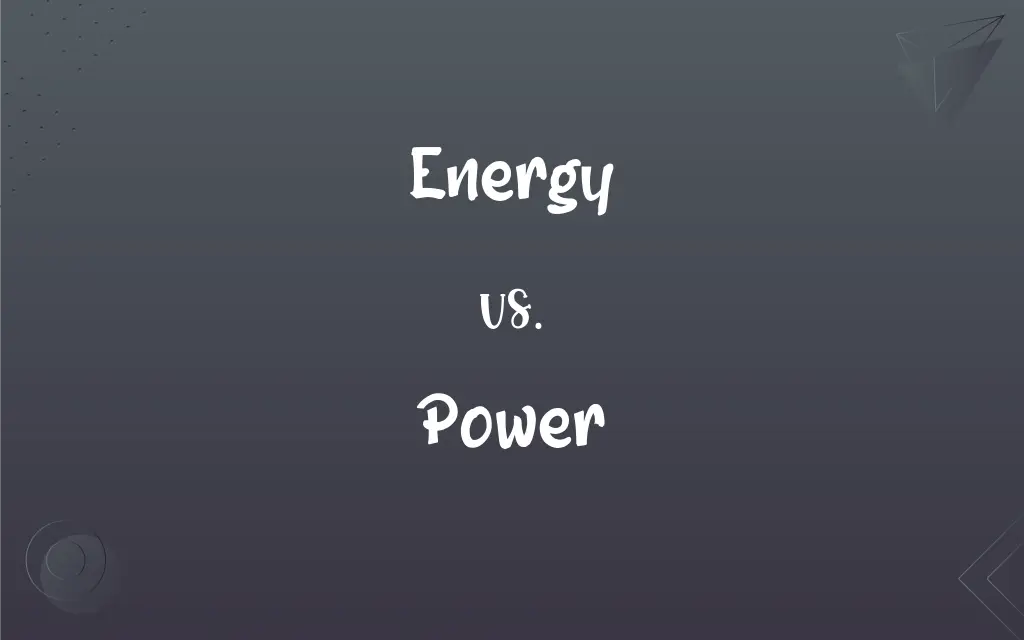Energy vs. Power: What's the Difference?
Edited by Aimie Carlson || By Harlon Moss || Updated on October 24, 2023
Energy is the capacity to do work, while power measures the rate at which work is done or energy is transferred.

Key Differences
Energy defines the ability or capacity to perform work or produce change. It can be stored or transferred, and comes in various forms such as kinetic, potential, thermal, or chemical. Power, on the other hand, signifies the speed or rate at which this energy is used or produced. A system can have a lot of energy but can use it at a slow rate, indicating low power.
Consider a battery storing energy. The amount of energy it holds determines how long it can provide electricity. Power, in this context, would dictate how quickly the battery can deliver that energy. A powerful battery delivers its energy rapidly, while a less powerful one might deliver the same amount of energy but over a longer period.
When observing machines or devices, energy represents the total work they can do without needing a recharge or refuel. Power, however, relates to the machine's operational efficiency. A high-powered machine can perform its function faster and more intensely than a low-powered one, even if both have the same amount of energy stored.
The units of measurement also differentiate energy and power. Energy is measured in joules (or calories, kilowatt-hours, etc.), signifying the amount of work done. Power is measured in watts, indicating the energy used or produced per unit of time.
In everyday speech, people sometimes use the terms energy and power interchangeably. However, in the scientific context, they have distinct meanings. While both energy and power pertain to work and its execution, energy focuses on the capacity, and power emphasizes the rate.
ADVERTISEMENT
Comparison Chart
Definition
Capacity to do work
Rate at which work is done or energy is transferred
Context
Amount stored or transferred
Speed of energy use or production
Examples
Battery's charge, fuel in a tank
Speed of battery discharge, engine's horsepower
Units of Measurement
Joules, calories, kilowatt-hours
Watts
Everyday Interpretation
Potential or ability
Intensity or speed
ADVERTISEMENT
Energy and Power Definitions
Energy
Vitality or intensity of expression.
The dancer performed with such energy that the audience was captivated.
Power
Influence or authority over others.
The president holds significant power in the government.
Energy
The ability to do work or produce change.
Wind turbines convert wind energy into electrical energy.
Power
The rate at which work is done or energy is used or produced.
A 100-watt bulb consumes power at a rate of 100 joules per second.
Energy
The property of matter that enables it to do something, potential or actual.
Gasoline contains chemical energy that can be converted into motion.
Power
The ability or capacity to act or do something.
With great power comes great responsibility.
Energy
A source of power, such as fuel and electricity.
Solar panels harness the sun's energy to produce electricity.
Power
A mathematical property expressed by an exponent.
In the equation 2^3, the number 3 represents the power.
Energy
The spiritual or immaterial force within a person.
Meditation helps in balancing one's inner energy.
Power
Physical might or strength.
The boxer demonstrated his power with a knockout punch.
Energy
The capacity for work or vigorous activity
Who has the energy to climb that trail?.
Power
The ability or capacity to act or do something effectively
Is it in your power to undo this injustice?.
FAQs
How is power related to energy?
Power measures the rate at which work is done or energy is transferred.
Can a system have high energy but low power?
Yes, if it uses or releases its energy over a longer period of time.
Does a more powerful light bulb consume more energy?
It consumes more energy per unit of time, but total consumption depends on how long it's on.
How is power measured?
Power is measured in watts.
Is kinetic energy a form of stored energy?
No, kinetic energy is the energy of motion, whereas potential energy is stored.
Can two devices have the same energy but different power levels?
Yes, they can store the same amount of energy but use or produce it at different rates.
Can a person's energy refer to their enthusiasm or vitality?
Yes, in everyday language, "energy" can refer to someone's vigor or liveliness.
How are energy and power conservation related?
Conserving energy reduces the total amount consumed, while power conservation focuses on reducing the rate of consumption.
Which unit is used to measure energy?
Energy is commonly measured in joules.
How does a battery's power differ from its energy?
A battery's energy denotes how long it can provide electricity, while its power dictates how quickly it can deliver that energy.
Can energy be converted from one form to another?
Yes, energy can be converted between different forms, like from potential to kinetic.
Does a high-powered machine always use more energy?
Not necessarily; it uses energy faster, but the total energy used depends on the duration of operation.
Is the energy in food related to its calorie content?
Yes, calories represent a unit of energy provided by food.
Can you have power without energy?
No, power denotes the rate of energy usage or production. Without energy, there's no power.
How is gravitational potential energy different from chemical energy?
Gravitational potential energy relates to an object's position in a gravitational field, while chemical energy is stored in molecular bonds.
What does "power" mean in a mathematical context?
In mathematics, power refers to the number of times a number is multiplied by itself.
What does energy represent in physics?
Energy represents the capacity to do work or produce change.
How do renewable energy sources produce power?
They convert natural energy, like wind or sunlight, into electricity at a certain rate, which is their power output.
In what contexts are the terms energy and power often confused?
In everyday speech, the terms are sometimes used interchangeably.
How is the power of an engine typically represented?
The power of an engine is often represented in terms of horsepower.
About Author
Written by
Harlon MossHarlon is a seasoned quality moderator and accomplished content writer for Difference Wiki. An alumnus of the prestigious University of California, he earned his degree in Computer Science. Leveraging his academic background, Harlon brings a meticulous and informed perspective to his work, ensuring content accuracy and excellence.
Edited by
Aimie CarlsonAimie Carlson, holding a master's degree in English literature, is a fervent English language enthusiast. She lends her writing talents to Difference Wiki, a prominent website that specializes in comparisons, offering readers insightful analyses that both captivate and inform.































































